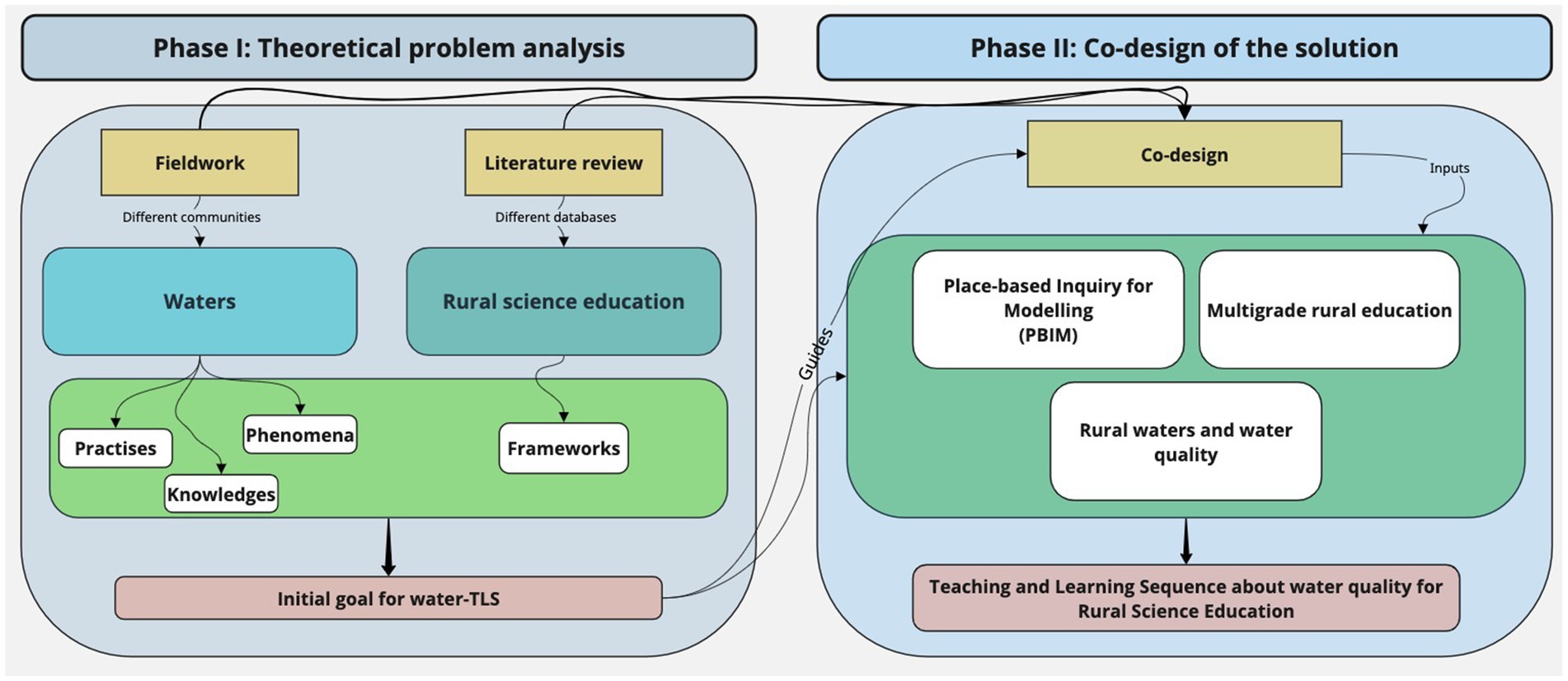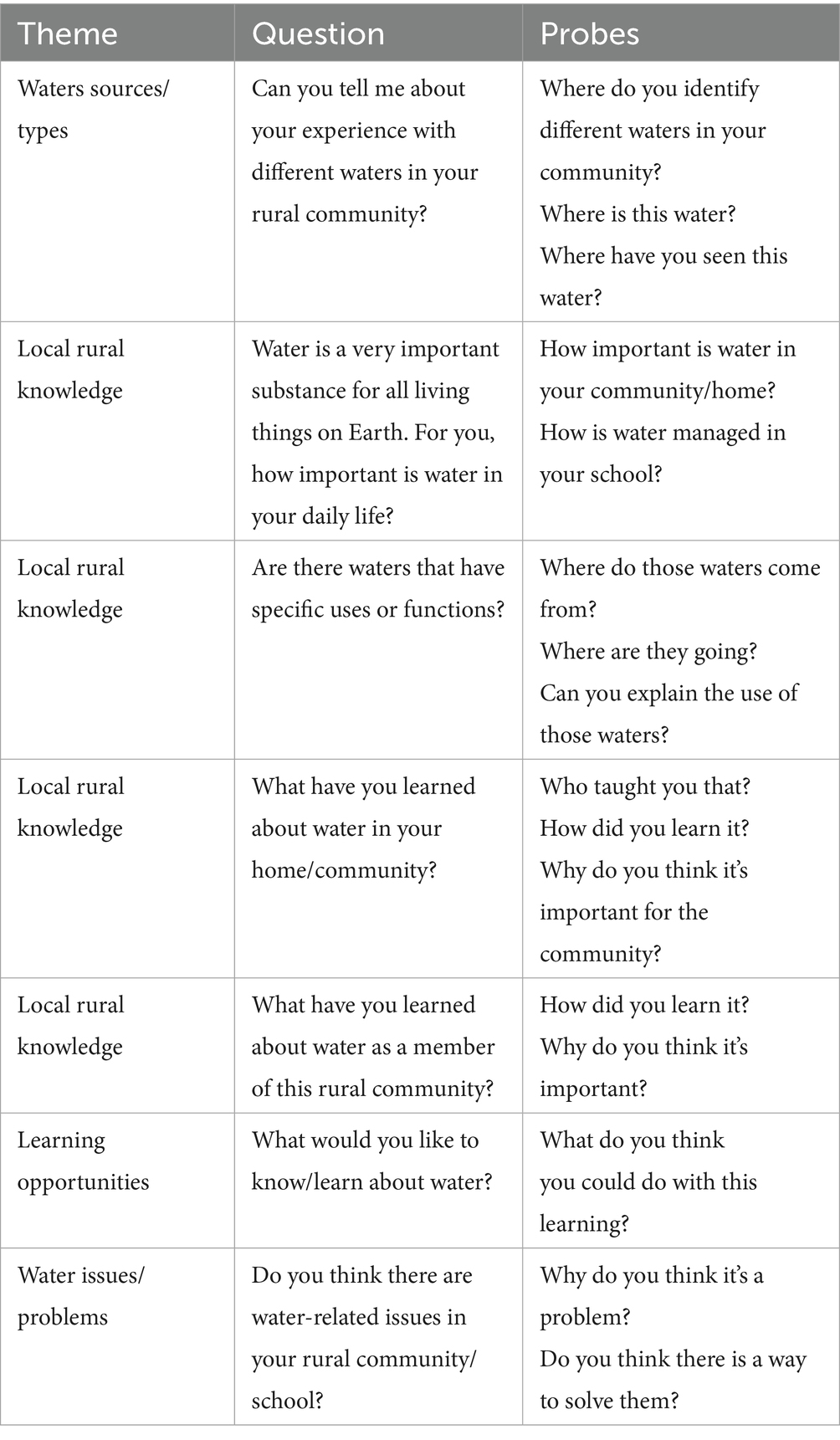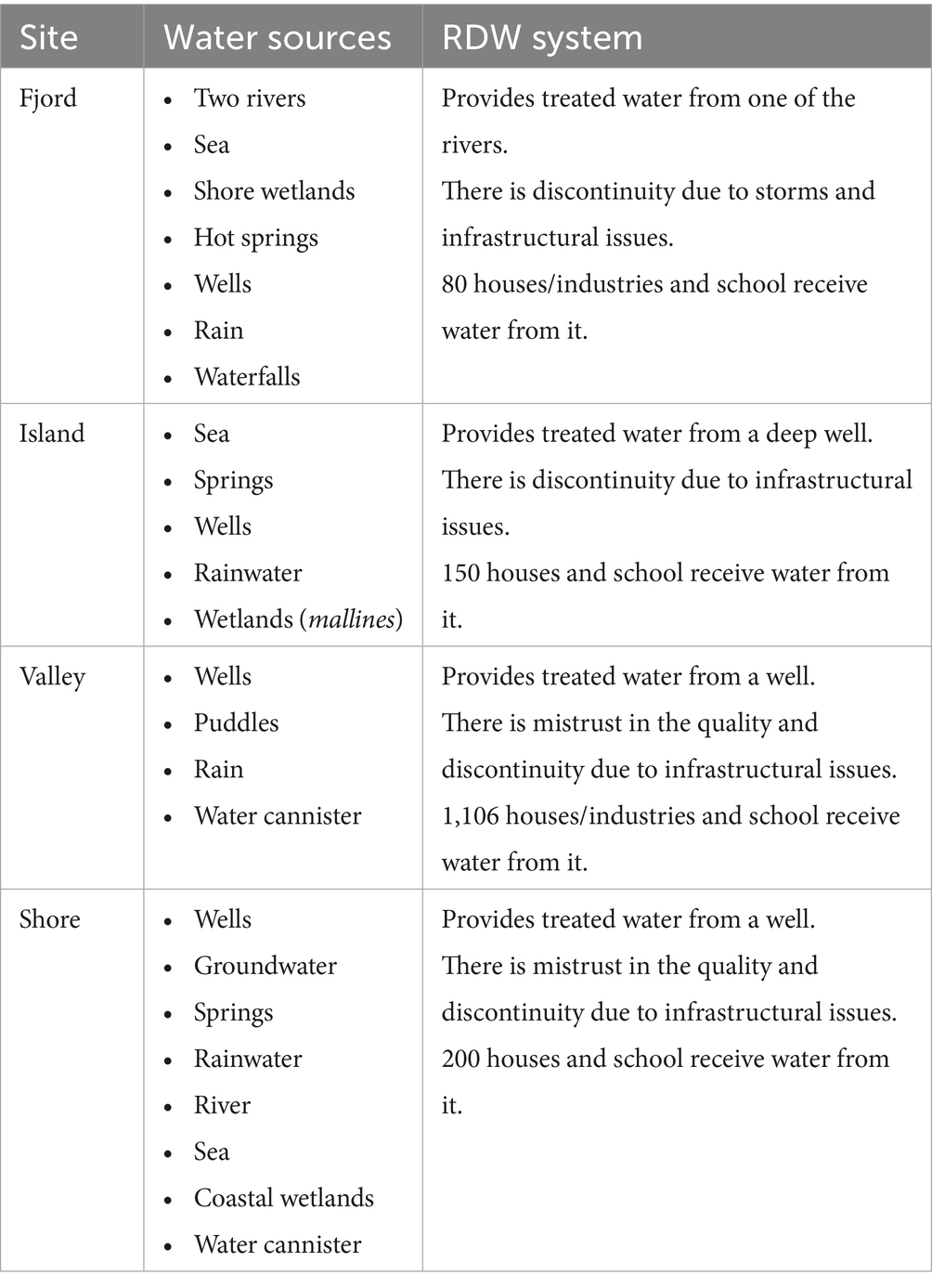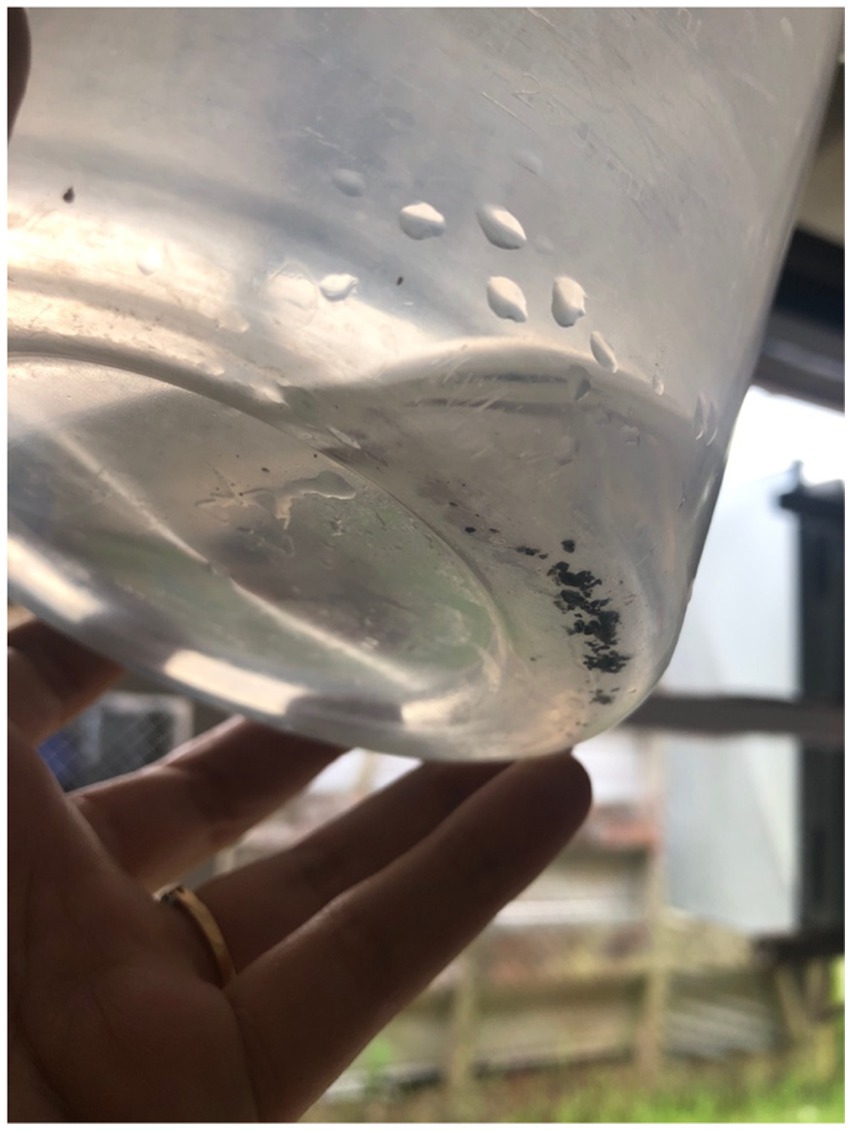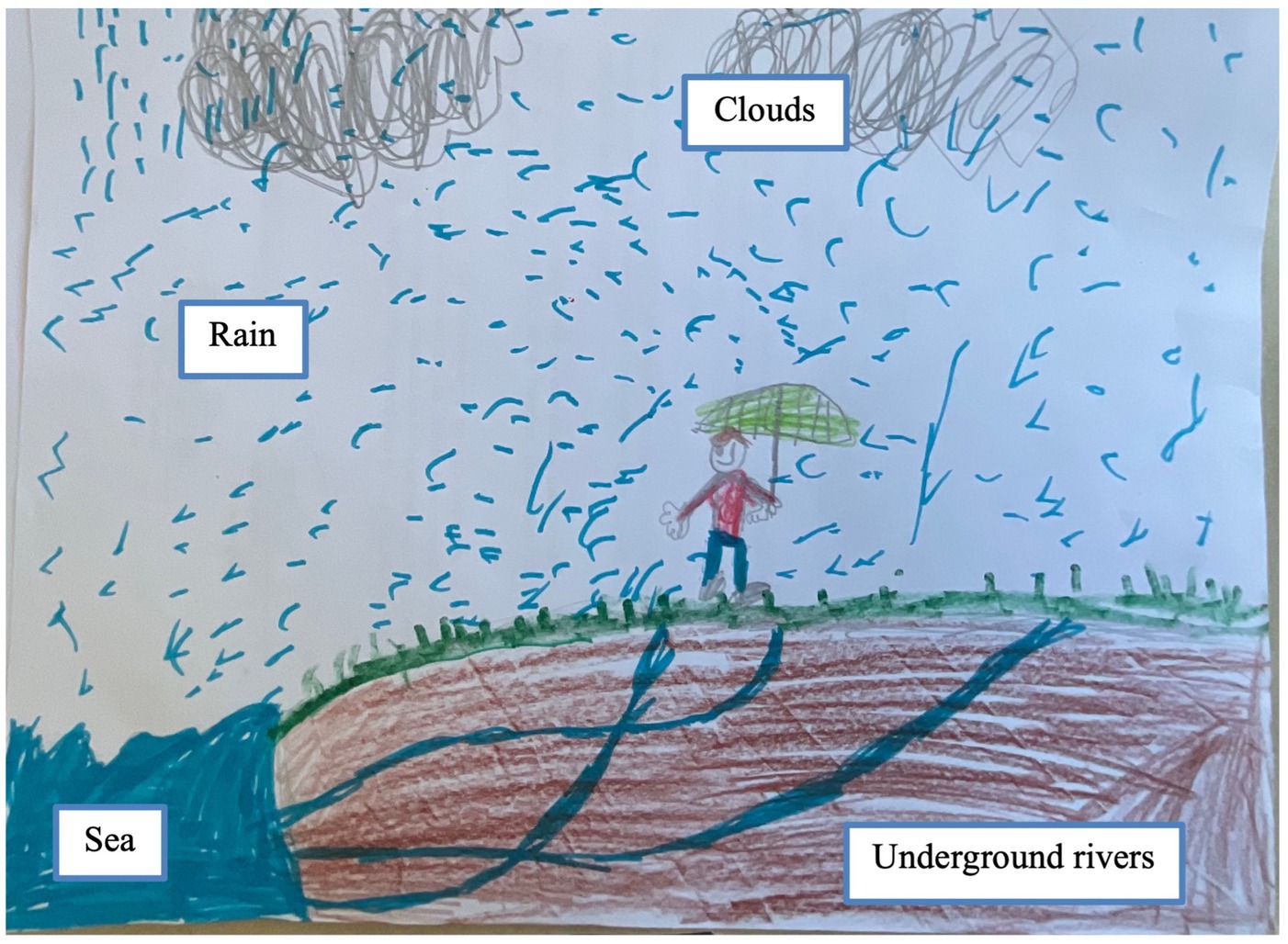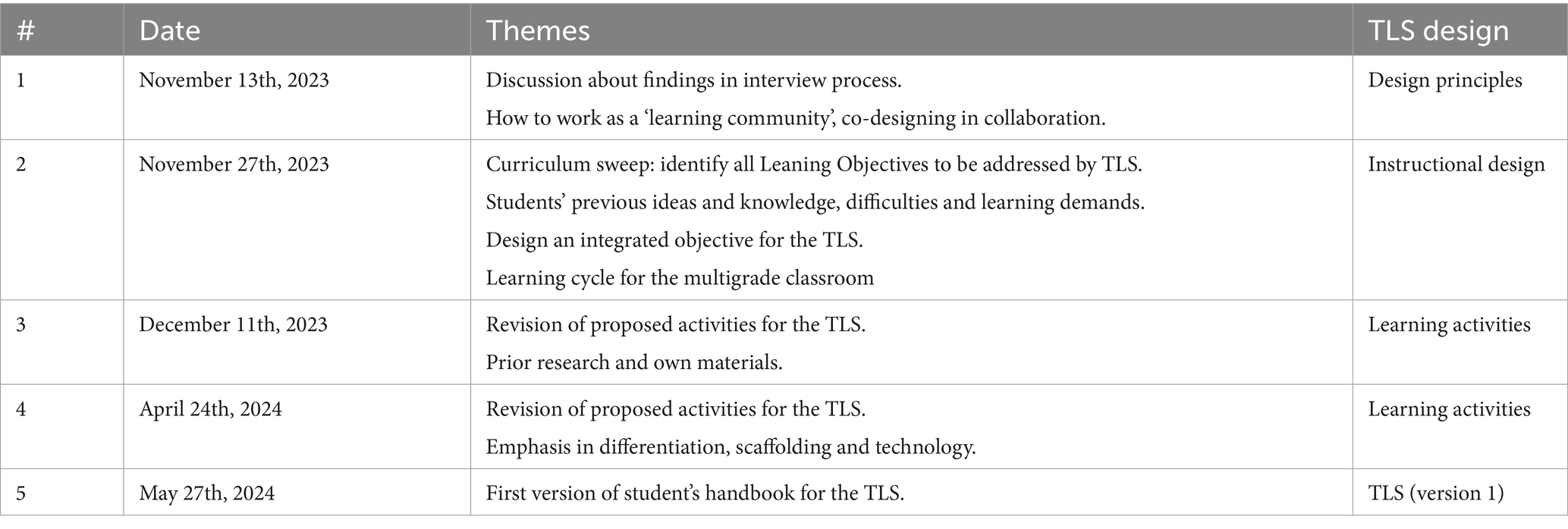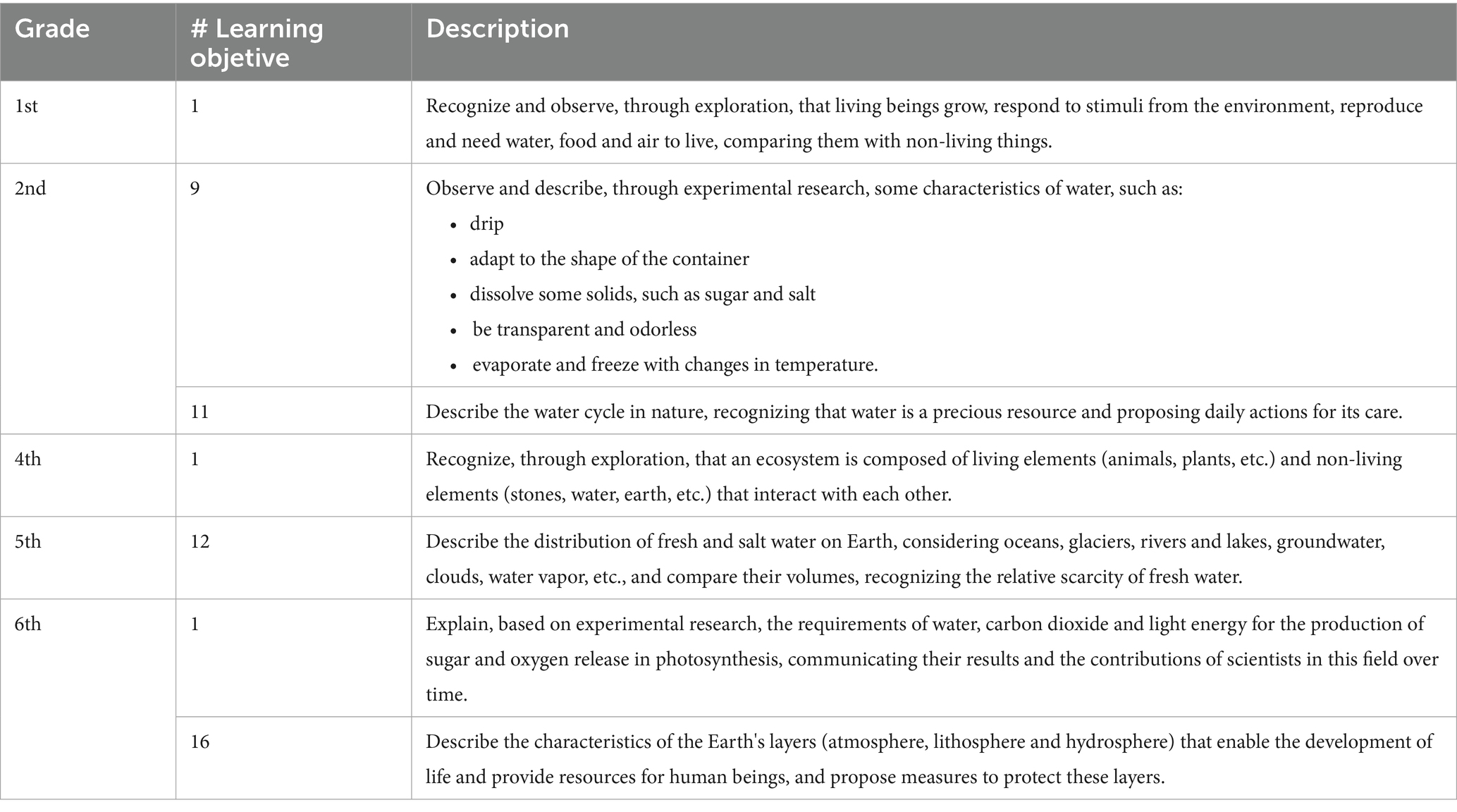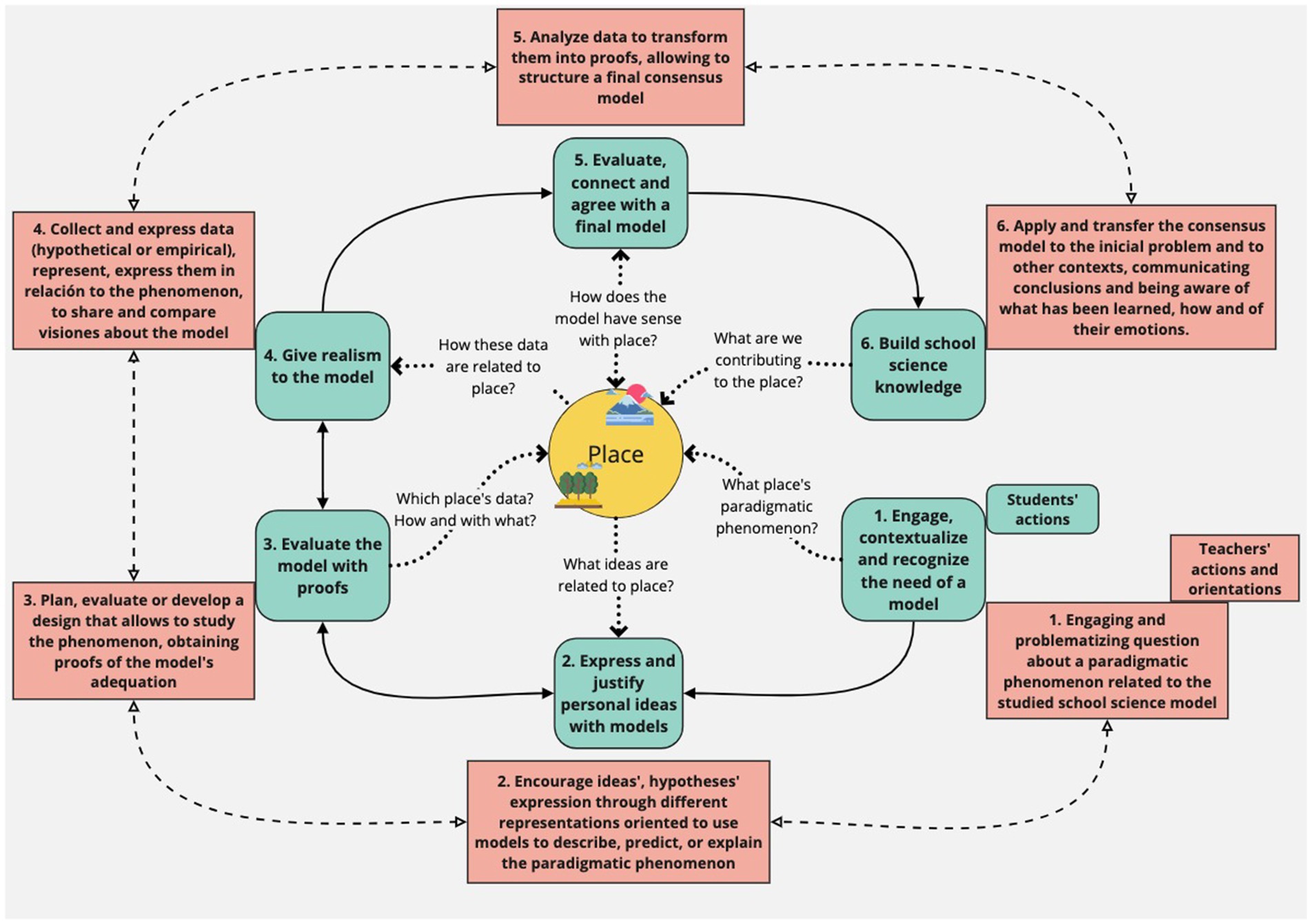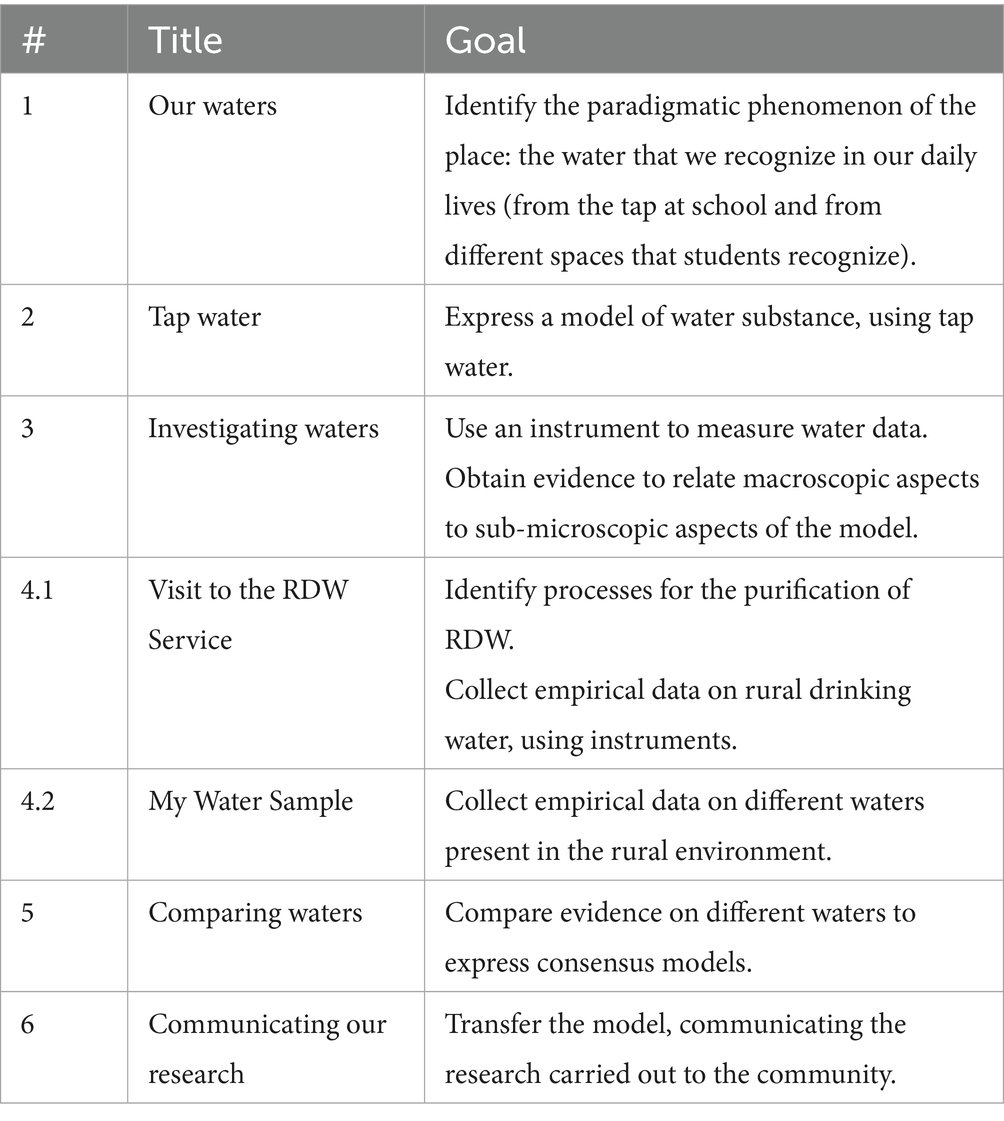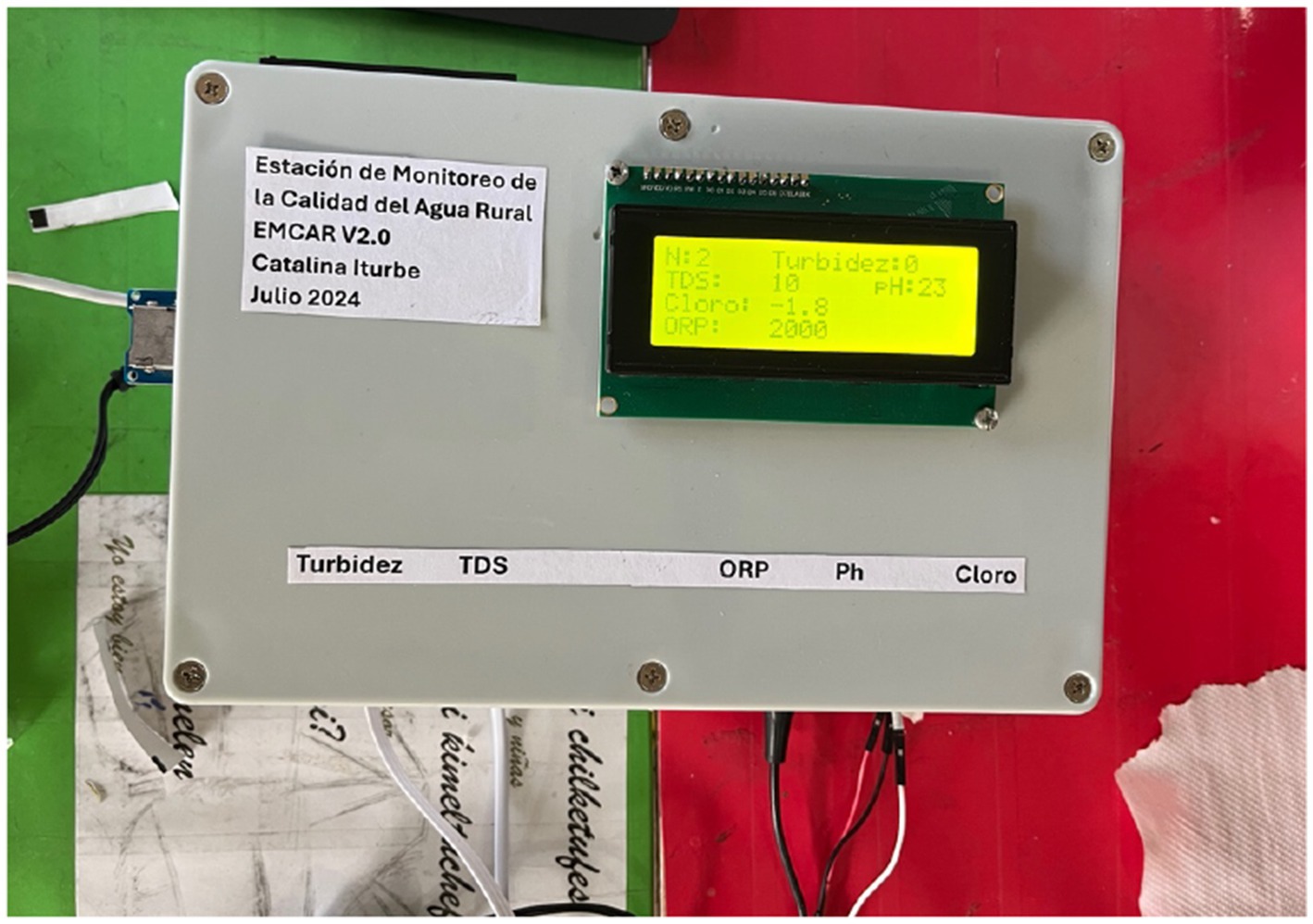- 1Centro de Docencia Superior en Ciencias Básicas, Sede Puerto Montt, Universidad Austral de Chile, Puerto Montt, Chile
- 2Doctorado en Didáctica de las Ciencias, Facultad de Ciencias, Pontificia Universidad Católica de Valparaíso, Valparaíso, Chile
- 3College of Education, Health and Human Sciences, Department of Curriculum and Instruction, University of Idaho, Moscow, ID, United States
- 4Laboratorio de Didáctica de la Química, Instituto de Química, Facultad de Ciencias, Pontificia Universidad Católica de Valparaíso, Valparaíso, Chile
This study addresses the advancement of rural science education (RSE) through a focus on water education in Chile’s Los Lagos Region. Employing a Design-Based Research approach with four rural communities, the research first aimed to characterize local rural knowledge (LRK) and identify educational needs regarding local water sources, quality, and infrastructure challenges. Second, it focused on the collaborative co-design with teachers of a contextually relevant teaching and learning sequence (TLS) for water education. The developed TLS emphasizes water quality and utilizes a Place-Based Inquiry for Modeling approach, encouraging students to engage in authentic inquiry using sensor technology to gather and analyze real-time data about their local water. This process integrates LRK with national science standards in Chile to enhance students’ understanding and participation in water-related issues. The study underscores the critical importance of local contexts, community involvement, and participatory design in creating effective RSE. Findings have implications for educators, researchers, and curriculum designers seeking to integrate place-based learning, technology, and LRK in rural educational settings.
1 Introduction
Rural science education (RSE) faces unique challenges. Rural schools often serve diverse student populations, have limited resources, and are often geographically isolated (Panizzon, 2012; Oliver and Hodges, 2014). However, rural communities offer a rich context for science learning, with direct access to natural environments and real-world applications of scientific concepts (Avery, 2013). This research focuses on the need to advance RSE, using Chile as a case study to explore the challenges and opportunities, with a particular focus on how technology can enhance water education that emerges from research.
Rural schools worldwide often struggle with issues such as teacher shortages, high teacher turnover, and limited access to professional development opportunities and technology (Oliver, 2007; Oliver and Hodges, 2014). Actors such as these can impact the quality of science education in rural areas, leading to disparities in student achievement and access to Science, Technology, Engineering and Mathematics (STEM) careers (Murphy, 2022), where RSE can act as a driving force for social justice (Eppley, 2017). Furthermore, curriculum materials may not be relevant to the unique needs and contexts of rural learners, failing to connect scientific concepts to their lived experiences and local environments (Carrete-Marín and Domingo-Peñafiel, 2022). By leveraging local knowledge, community resources, and place-based approaches, RSE fosters a deeper understanding of the natural world and empowers students to address local challenges through scientific inquiry (Conceição et al., 2019).
In Chile, rural education faces specific challenges, including multigrade classrooms where teachers must cater to students of different ages and abilities simultaneously. This situation demands innovative pedagogical approaches and flexible curriculum design to ensure that all students have access to quality science education. Furthermore, instructional materials for multigrade rural schools often present decontextualized conceptual understandings, including crucial topics such as the water cycle (Iturbe-Sarunic, 2022). However, Chile’s diverse geography and rich natural resources offer unique opportunities for place-based science education, allowing students to connect with their local environment and engage in authentic scientific inquiry.
This study addresses the critical issue of water education in rural Chile, addressing the role of technology in enhancing learning and promoting responsible resource management. Water is a vital resource for all communities, but it holds particular significance in rural areas where livelihoods often depend on agriculture, fishing, and other water-related activities. This research is focused on rural water issues, which are critical in rural settings (Intergovernmental Panel on Climate Change, 2023). It is situated in the Los Lagos Region of southern Chile, a region characterized by a rainy climate, abundant water bodies, and a close relationship between communities and their natural environment (Gárate, 2021). Despite the abundance of water resources, rural schools and communities in this region face challenges related to water quality, impacting school operations and community well-being (Fundación Amulén, 2021). This context provides a compelling case for investigating how a community’s LRK (Avery, 2013), place-based science education, and teachers’ direct involvement in the innovation’s design can address pressing local needs while fostering scientific literacy.
This study explores the potential of integrating sensor technology into water education in rural schools through the design of a teaching and learning sequence (TLS) on water quality. Sensors can provide real-time data on various water-related parameters, such as water level, flow rate, temperature, and quality (Kedia, 2015; Thomson, 2021). By using sensors to collect and analyze data, students can engage in authentic scientific inquiry, develop a deeper understanding of scientific models involved in water-related phenomena, and contribute to solving local water management challenges. For example, students can use sensors to monitor water quality in local streams, assess the efficiency of irrigation systems, or investigate the impact of land use on water resources. The hands-on experience designed with technology enhances student engagement, promotes critical thinking skills, and fosters a sense of responsibility toward water conservation and management in rural communities that govern their own water resources.
2 Theoretical perspectives
This study is grounded in theoretical perspectives that emphasize the importance of context, local knowledge, and iterative, collaborative design in developing meaningful educational interventions for rural settings. Specifically, we draw upon the concepts of LRK as a cornerstone of Place-Based Education (PBE) and Design-Based Research (DBR) as our methodological and theoretical framework.
2.1 Local rural knowledge and place-based education
Rural communities possess rich, historically accumulated knowledge about their environment, practices, and socio-cultural dynamics, often referred to as LRK. This knowledge, built upon lived experiences and intergenerational transmission, offers a vital resource for science education. Avery (2013) highlights LRK as a valid and valuable form of understanding that encompasses a community’s relationship with the land, its resources, and the challenges it faces. In this study, LRK is understood as knowledge historically accumulated around phenomena that provide communities with their life experiences, are sensitive to diverse forms of knowing, and are crucial for authentically connecting school knowledge with the place through concrete experiences.
The incorporation of LRK is central to PBE, an approach that connects learning to the local environment, culture, heritage, and community issues (Gruenewald, 2003; Smith, 2013). PBE posits that schools can serve as catalysts for environmental awareness and community development by embedding learning in local contexts. This fosters a deeper understanding of socio-environmental problems and empowers students to become active citizens committed to their territory. By integrating local knowledge systems, PBE makes learning more relevant and significant for students in rural areas (Gruenewald and Smith, 2008). This aligns with the concept of ‘funds of knowledge’, which recognizes the rich intellectual and cultural resources that students bring from their homes and communities into the classroom (Moll et al., 1992; Cruz et al., 2018).
2.2 Design-based research and the development of teaching and learning sequences
Design-Based Research serves as the core methodological and theoretical approach in this study, as an iterative and practical methodology aimed at developing educational innovations and theory within real-world settings (The Design Based Research Collective, 2003; Guisasola, 2024). It is characterized by deep collaboration between researchers and educators, a focus on designing and implementing interventions to address complex and authentic problems, and a commitment to generating shareable knowledge that informs both educational theory and practice (Barab and Squire, 2004). A primary outcome of DBR processes in educational contexts is often the development of such interventions, frequently taking the form of theoretically grounded and empirically refined TLS.
Teaching and learning sequence are purposefully designed, coherent sets of teaching and learning activities, developed to help students achieve specific learning goals by addressing curricular issues (Méheut and Psillos, 2004). The design of effective TLS is itself a significant focus of educational research, aiming to create sequences that are both learnable for students and usable by teachers. Within a DBR framework, the development of TLS is not a linear process but an iterative one, where sequences are systematically designed, enacted in classrooms, and then revised based on empirical findings regarding student learning and practical implementation challenges (Guisasola et al., 2021).
The epistemic principles of DBR, such as the development of iterative teaching experiments, the explicit articulation of theoretical assumptions underpinning the design, and the generation of design principles as ‘humble theories’ (Guisasola, 2024), are directly applicable to the creation and refinement of TLS. These design principles for TLS often emerge from the DBR process and can inform future educational designs in similar contexts. In this study, DBR facilitates the collaborative co-design of TLS among diverse actors—researchers, teachers, students, parents, and community agents—to generate solutions for pressing socio-environmental issues, such as water quality for rural schools. This collaborative approach ensures that the resulting TLS articulates various forms of knowledge (scientific, pedagogical, and local) and is theoretically robust, contextually relevant, and practically implementable in addressing the unique challenges of rural education (McKenney and Reeves, 2018).
3 Materials and methods
The research is framed within DBR (Guisasola et al., 2021; Merino et al., 2022; Pernaa et al., 2022) to facilitate the generation of didactic knowledge about the nature and conditions of teaching and learning through the design and implementation of an educational innovation in the classroom. This study, therefore, aims to: (1) characterize LRK and identify educational needs regarding water in selected Chilean rural communities and (2) collaboratively design and develop a contextually relevant TLS for water education through a DBR methodology. The overarching goal is to explore how rural water issues can be addressed through place-based, inquiry-driven, and technology-enhanced approaches to advance RSE.
The methodological design is organized into two phases: (Phase I) theoretical problem analysis and (Phase II) co-design of the solution (Figure 1).
This study reports on the execution and outcomes of the initial two phases of the DBR, which directly address the study’s primary aims. Phase I (theoretical problem analysis) was designed to characterize LRK and identify educational needs concerning water issues within the selected Chilean rural communities (Aim 1). This involved an in-depth exploration where the invaluable knowledge of local inhabitants was central to enriching the problem analysis. Phase II (co-design of the solution) focused on the collaborative design of a contextually relevant TLS for water education (Aim 2). This phase emphasized a participatory approach, ensuring that the TLS design integrated the researchers’ perspectives with the insights and experiences of local teachers and community members, thereby fostering a solution grounded in the local context and needs.
The research approach is qualitative, focusing on everyday practices and local knowledge related to the studied issue. The goal is to highlight a part of the world (the rural areas of the Los Lagos Region) through interpretative practices and materials, naturally accessing and interpreting phenomena based on local meanings (Denzin and Lincoln, 2018). The philosophical stance follows a pragmatic interpretative paradigm (Creswell and Poth, 2018), aimed at solving real-world problems with various approaches to gather and analyze information across different contexts.
3.1 Phase I: theoretical problem analysis
This phase was designed to characterize LRK and identify educational needs concerning water issues within the selected Chilean rural communities (Aim 1). This involved an in-depth exploration where the invaluable knowledge of local inhabitants was central to enriching the problem analysis.
3.1.1 From an academic lens
To analyze the problem from an academic lens, a scope review (Iturbe-Sarunic and Merino, 2021) and a systematic literature review were conducted, focusing on research about science education proposals or curricula implemented in rural schools across the world. However, the academic lens is not enough to comprehend the nature and complexity of the phenomena that are locally relevant. This expanded our problem analysis to an ethnographic phase, which will be developed next.
3.1.2 As an ethnography—lens from the field
By ascribing to an interpretative pragmatic paradigm, we were oriented to find solutions to real-world problems, using different approximations to the data recollection and analysis in different contexts, using diverse methods oriented to address research questions (Creswell and Poth, 2018). The approach for this research is qualitative because of our interest in “everyday practices and everyday knowledge that refers to the question studied” (Flick, 2015, p. 24). As researchers, we are aligned with this approach because our intention is to make visible a portion of the world (the rurality of the Los Lagos Region) through a repertoire of interpretative practices and materials, accessing the phenomena of study in a naturalistic way and interpreting them from the meanings that people make (Denzin and Lincoln, 2018).
To carry out a deep immersion in the field, a series of interviews and stays in the different territories were carried out in 2022, 2023, and 2024, to understand through the field, the issues that needed to be addressed for RSE. The research protocol and the consent forms are approved by Pontificia Universidad Católica de Valparaiso’s Bioethics Committee (BIOEPUCV-H 566–2022). Participants are from four different locations in the Los Lagos Region, Chile, representing various geographies such as fjord, coast, valley, and island. The localities were chosen due to the previously established relationship of rural schoolteachers from these places with the first author. Participants in the immersion and interview processes are students (S) from rural schools (ages 7–11), parents (P), local leaders (L), and teachers (T) themselves.
At the semi-structured interviews, the conversation revolved around the different waters that they could recognize in their places. In the case of teachers and students, we started the interviews asking them to draw different waterbodies and the water cycle in their place, to detail some ideas that could be present regarding science instruction and the model of the water/hydric cycle or the relationship with waters that could emerge from this kind of data. Notes and pictures were taken by the first author at all sites to promote a deep immersion aligned with this ethnographic lens.
Questions for the interviewed are shown in Table 1 and were created drawing from Avery’s LRK (2013), water and water cycle’s representations (Márquez and Bach, 2007), and research in the field of STEM education within indigenous communities (Miller and Roehrig, 2018). Themes that were addressed through the interview were water sources/types, LRK, learning opportunities and water issues/problems. Addressing these themes in interviews was discussed between authors before their immersion in the field, and questions and probes were revised to gather rich data that reflects the meaning of those who participate in the study. The alignment between themes and questions-probes is stated in Table 1.
Interviews were held face-to-face at the school or their homes, in the different territories that are represented in this research. All interviews were videotaped and transcribed, along with notes from the conversation.
Fieldnotes of the first author were also a source of data, allowing to introduce reflexivity to the analysis and triangulation of sources. Fieldnotes were transcribed and organized in a digital diary, accompanying every entry with pictures taken in that location.
3.2 Phase II: co-design of the solution
This phase was carried out from a participatory lens, considering co-design as a collaborative practice aimed at educational innovation, where the participants, regardless of their origin and experience, are equally working for a common goal (Iturbe-Sarunic and Silva-Hormazábal, 2023).
In line with the second aim of this study—to collaboratively design and develop a contextually relevant TLS for water education—this second phase of the DBR was dedicated to the co-design of this educational innovation. The primary output of this collaborative design effort was a practical TLS tailored to address the identified needs and local water issues. To structure this development, the co-design process drew systematically upon the framework by Muñoz-Campos et al. (2020), which encompasses the formulation of design principles, detailed instructional design, and the creation of specific learning activities. This intensive co-design work occurred through a series of five 1-h online sessions conducted between late 2023 and early 2024.
3.3 Data sources
In Phase 1 of this research, data from interviews, transcripts, videos, pictures, and fieldnotes were analyzed. In Phase 2, co-design sessions were analyzed from sources such as videos, support material, interactive blackboards and resources provided by teachers, and kept available in a shared folder with the co-design group. It is important to mention that all transcripts and materials are in Spanish, and the translation of them is done by the first author, who is a native Spanish speaker and fluent in English.
3.4 Analysis strategy
Reflective thematic analysis (Boyatzis, 1998; Braun and Clarke, 2006, 2019) was used to introduce reflexivity in the analyses. The first level of analysis allows topics to be grouped, and the second level of analysis allows researchers’ reflexivity to be related to the themes. Thematic analysis requires a strong immersion in data to search and identify themes, also connecting themes and subthemes that emerge. It is important to go back to the data to support reflections and provide citations from transcripts or other data sources, such as photographs and field notes, trying to reduce biases by offering context and triangulation (Creswell and Poth, 2018).
4 Results
The findings of this study are presented in alignment with its two primary research aims: (1) to characterize LRK and identify educational needs regarding water in selected Chilean rural communities and (2) collaboratively design and develop a contextually relevant TLS for water education.
4.1 Characterizing local rural knowledge and educational needs regarding water
This section presents findings from Phase I of the DBR, focusing on the ethnographic exploration conducted in the four selected rural Chilean communities. The first author’s prior engagement with the participating teachers facilitated access and rapport; however, we remained mindful of potential biases by triangulating interview data with field observations, photography and videos. We also sought diverse perspectives within each community by addressing the same themes in all interviews through similar questions.
4.1.1 Diverse water realities and sources across rural communities
Each of the four rural communities—fjord, island, valley, and shore—presented unique yet interconnected water realities. Across all sites, the rural drinking water (RDW) system was a primary source, though often supplemented by other sources due to issues of reliability or perceived quality. The details for each community are detailed in Table 2.
Important to note is the identification of water cannisters as a source of drinking water. This is due to the perceived lack of quality of drinking water and the educational administration’s need to offer safe drinking water. This was noted in several visits by the first author, and Figure 2 is an example retrieved in December 2022 at the shore community.
The RDW committee estimates the population that is served by the RDW. In two cases (fjord, valley) they also serve industries. The latter is important due to the sustainability of jobs in these places. It is also noted that at the time this research was conducted, all sites were experiencing service disruptions (2022–2023). It is worth mentioning that these difficulties have now been resolved at all locations since 2024, which is promising for the collaborative work with the school and community.
4.1.2 Rich local rural knowledge pertaining to water
Interviews across all participant groups (students, parents, teachers, and local leaders) revealed a substantial body of LRK concerning water, rooted in daily experiences, observation, and intergenerational transmission. In consequence, subthemes emerge from interviews, such as the knowledge of water sources and systems, the water cycle and water properties, water importance and management in the community, cultural and ancestral knowledge, and awareness of change:
• Knowledge of water sources and systems: participants demonstrated detailed knowledge of their local water sources, their characteristics, and uses. Students, for example, showed a remarkable understanding of how the RDW system in their area functions, including intake sources and distribution to homes and schools. As one student from the fjord described, “we have water from a river, it comes down from the top of the road and goes through hoses. And always when it rains they have to go and clean it, so that it does not get dirty (…) And they have a little mesh where all the dirt is left” (S2-fjord). Parents and local leaders also knew specifically where the RDW water was sourced.
• Understanding of the water cycle and water properties: students through their drawings demonstrated knowledge of the water cycle, including evaporation, cloud formation, rain, and underground rivers, as exemplified in Figure 3. This was often connected to direct observations of the local environment. Students also understood that water for drinking must be fresh, not saltwater, and possess certain qualities (e.g., no smell or color). For example, S2-valley mentioned in an interview that “sometimes water is cut off and comes out dirty. We open the tab, and it is yellow water.”
• Importance and management of water: a deep recognition of water’s importance for life, agriculture, hygiene, and ecosystems was universal. Water management practices, such as conserving water in daily use, rainwater harvesting, cleaning water sources, and even rudimentary filtration, were observed in households and schools. One parent from the shore community explained, “because when it rains. And even if we have water from the RDW I have my containers… just in case suddenly a water shutoff (…) serves us for any little thing in the house” (P-shore).
• Cultural and ancestral knowledge: particularly from parents identifying with the Huilliche indigenous people, valuable cultural knowledge about water was shared, including beliefs about medicinal waters and the spiritual significance of natural water sources. One student shared, “in our ancestral worldview the water cycle is very important, because one learns that you are water, you were water and you will be water” (S3-island). In the fjord community, a parent part of the indigenous community also shared:
There are medicinal waters. For example, when a guagüita [little baby] is born, the old people say that you should give them trayenko water [water that falls, in indigenous language]. With time, I have discovered in my daily life that when I wash myself with cold water after tending my vegetable garden, you do not have any kind of pain the day after (…) The same water from the hot springs also is used for bone pain.
• Awareness of change: local leaders, in particular, noted changes in water availability, attributing decreased flow in sources to factors like misuse by industries, gentrification, and climate change. L-shore is direct about this:
(…) with global warming groundwater tables are getting dry and there is a misuse of resources from some people that have more money, and they hog all the water (…) They misuse it and this [water] shall be protected only for human consumption.
4.1.3 Key water-related challenges and educational needs identified by communities
Across all four sites, communities identified significant water-related challenges, which in turn highlighted specific educational needs and learning opportunities. These are subthemes, such as water quality concerns, water scarcity and intermittent supply, infrastructure issues, pollution, unequal access and knowledge, and desire for technical knowledge and technological application.
• Water quality concerns: a primary concern in all communities was the quality of RDW, which was often described as cloudy, smelly, or discolored. For example, “sometimes the water is cut off and comes out dirty. When the faucet is opened, yellow water comes out” (S1-valley). This led to a desire to understand water treatment processes and water chemistry. Students expressed wanting to learn about water sanitation, filtration, and how to clean it (S3-valley). Teachers and local leaders also voiced a need to understand “how the water of the river and then the water with the chlorine [are mixed], and how the process is done” (T-fjord) and “the [proper] amounts of chlorine, [how to take] the samples, how it is measured” (L-island).
• Water scarcity and intermittent supply: scarcity, especially during summer droughts or due to RDW system failures such as engine breakdowns (L-valley) and pipe breakages (L-island), was a recurring problem impacting daily life and school operations. This underscored the need for education on water conservation and alternative supply management.
• Infrastructure issues: problems with RDW infrastructure, including obsolescence, lack of meters, low distribution capacity for growing populations (L-valley, L-island), and damage from heavy vehicles (L-island), were frequently mentioned. This pointed to a need for community understanding of RDW system management and potential solutions.
• Pollution: concerns about water pollution from garbage, industrial waste (e.g., salmon farms), and sewage were raised, particularly in coastal and fjord communities. Students were aware of pollution impacts, with one noting, “many animals have died (…) for example, the seagull gets entangled in the pouches… And barges sometimes come in and throw their material into the water.” (S1-fjord).
• Unequal access and management knowledge: issues of unequal access to drinking water (L-valley) and a perceived lack of broader community knowledge about water management and conservation were identified as contributing factors to problems (L-fjord, L-coast, L-island).
• Desire for technical knowledge and technological application: local leaders expressed a desire for more technical training related to water management and quality monitoring, as L-fjord states, “something very technical might be nice.” Teachers also saw opportunities in “some system to optimize the use of water. something that is efficient, that is low cost that can be installed” (T-valley), highlighting an interest in practical, technology-enhanced solutions.
4.1.4 Synthesis of phase I
The ethnographic exploration in the four rural communities of the Los Lagos Region revealed that while communities possess rich LRK regarding their diverse water sources, the water cycle, and traditional management practices, they face significant contemporary challenges. These include pervasive concerns about drinking water quality from RDW systems, issues of water scarcity and intermittent supply, aging or inadequate infrastructure, and localized pollution. These challenges directly translate into educational needs: a desire for a deeper understanding of water treatment processes, water chemistry, RDW system functionality, sustainable water management, and the potential of technology to monitor and address these issues. This comprehensive understanding of LRK and identified educational needs formed the critical foundation for the subsequent co-design of a contextually relevant TLS.
4.2 Collaborative design and development of a contextually relevant teaching and learning sequence
This section details the outcomes of Phase II of the DBR, focusing on the co-design process and the features of the developed TLS.
4.2.1 Rationale and focus for the TLS: addressing water quality
Based on the pervasive concerns and expressed educational needs identified in Phase I across all communities, water quality emerged as the most pressing and relevant local issue to be addressed through the TLS. This focus was chosen due to its direct impact on the everyday lives of students, their families, and the functioning of their schools. Water quality is directly related to the RDW system, regarding its administration and the economic sustainability of the water treatment plant that supplies drinking water to each community.
The connection between what is perceived by the community about water quality and the pressing needs for support from local leaders results in a partnership where the RDW administration for each community commits to their participation in TLS’s activities. This is considered for the co-design process.
4.2.2 The co-design process: collaboration with teachers and community insights
The TLS was developed through a participatory co-design process, primarily involving the researchers and teachers from the four rural schools. This collaborative practice is aimed at educational innovation, valuing all participants as equals in working toward a common goal. The process was conducted through five 1-h online sessions between late 2023 and early 2024, and structured by the TLS design process from Muñoz-Campos et al. (2020) according to Table 3.
During these sessions, findings from the Phase I interviews were discussed, ensuring the TLS would be grounded in the identified LRK and community concerns. As T-valley argued, based on interview findings, “In this case it would be to see the quality, because the idea here is to see if the water is good or not.” This promoted that the central question guiding the TLS design became: ‘What is the quality of our rural water like?’
Teachers actively contributed to curriculum mapping, identifying relevant learning objectives from national standards for multigrade classrooms (latter in Table 4), and discussed students’ prior knowledge and potential learning difficulties.
The pedagogical approach, including the proposed Place-Based Inquiry for Modeling (PBIM) cycle, was discussed and refined. T-island highlighted the importance of modeling: “that each one makes their model and contrasts it with the ideas they had and with the data they are acquiring, I find that super important.”
Teachers shared and selected activities from their own experiences and prior research, ensuring the TLS would be practical and feel owned by them. For the multigrade settings, emphasis was placed on differentiation, scaffolding, and the meaningful integration of technology. Teachers stressed the importance of activities that all students could engage with, with differentiation in depth rather than entirely separate tasks.
4.2.3 Design features of the developed TLS for water education
The co-design process, following the framework of Muñoz-Campos et al. (2020), resulted in a TLS with distinct design features:
4.2.3.1 Guiding design principles
The TLS is underpinned by several key design principles:
• Socioconstructivist learning emphasizing that students learn by sharing, testing ideas, and reflecting on their thinking (Sanmartí, 2002).
• Integration of LRK and PBE: rooting learning in students’ local environments, everyday experiences, and community knowledge (Smith, 2013; Avery, 2013).
• Scientific inquiry and Modeling: Engaging students in authentic scientific practices, including asking questions, gathering evidence, and developing and refining models (Hernández et al., 2015; Jiménez-Liso, 2020). This led to the proposal of a PBIM learning cycle (Figure 4).
• Focus on the school’s scientific model of substance: addressing the substances in water that determine its quality (Marzábal et al., 2024).
• Technology as a mediating artifact: using technology (e.g., sensors) to facilitate model construction and bridge students’ reality with scientific theories (Soto et al., 2023).
• Empowerment and Connection to Place: aiming to empower students to communicate findings based on self-gathered evidence relevant to their local context.
4.2.3.2 Structure and content: instructional design
The instructional design translated these principles into a sequenced learning experience:
• Context and problem: this focused on rural waters and the issue of RDW quality.
• Driving questions: a series of questions guide the inquiry, such as ‘What waters are there in our rural community?’, ‘What is the quality of our rural water like?’, ‘What is in the water?’
• Integrated objective: “Evaluate, through experimental research, the quality of water in the rural community in which they live,” aiming to develop inquiry, modeling, and technology skills.
• Knowledge selection: a curriculum sweep identified relevant national standards (learning objectives) for multigrade elementary classrooms (Table 4), which notably lacked explicit mention of water quality. This curricular content was integrated with the LRK and water sources identified in Phase I.
• Sequencing activities: guided by the PBIM cycle (Figure 4), activities include engaging with local phenomena, expressing initial models, field trips (e.g., to RDW stations), using sensors for real-time data collection, and community dissemination of findings (Table 5).
• Assessment design: it includes formative and summative assessments, with rubrics proposed by teachers for practical skills, collaborative work, fieldwork attitudes, and final presentations.
• Multigrade approach: the instructional design provides a common guide for all students (1st to 6th grade), with differentiated instructions and expected responses for teachers to cater to varying age and ability levels, drawing on principles of multigrade education stated in the design principles.
4.2.3.3 Key learning activities and integration of technology
Learning activities were designed drawing from the co-design group’s personal portfolio, ensuring they were meaningful for the rural context and that teachers felt confident implementing them. The activities aim for a common language and engagement for all students in the multigrade classroom, using drawing and writing, with teacher guidance for progression and scaffolding.
A key technological component is the use of sensors to measure water quality parameters, such as turbidity, chlorine, pH, and total dissolved solids (Figure 5). This hands-on experience with technology is intended to allow students to gather authentic, real-time data about their local water, directly addressing the TLS’s focus on water quality, and fostering scientific inquiry skills. Further details of the learning activities are available in the Supplementary material.
5 Discussion
This study’s findings, emerging from the characterization of local water realities and the co-design of a tailored TLS, offer several key insights for RSE, technology integration, and curriculum development.
5.1 The primacy of local context: understanding rural water issues and leveraging local rural knowledge
Our ethnographic exploration revealed the profound and nuanced LRK communities possess regarding their specific water sources, challenges (such as quality, scarcity, and infrastructure issues), and traditional management practices. Simultaneously, significant educational needs were identified, particularly concerning a deeper understanding of water quality, RDW system functionality, and the desire for practical, empowering solutions.
These findings strongly affirm Avery (2013) assertion of the value of LRK, demonstrating that community members, including students, parents, teachers, and local leaders, are active knowers and possess a rich understanding of their hydro-social systems. The specific LRK documented—from detailed knowledge of local water sources and their behavior to intergenerational wisdom about water conservation, cultural significance, and awareness of environmental changes—provides a critical and authentic foundation for PBE (Gruenewald, 2003; Smith, 2013). Our study underscores that PBE in these Chilean rural contexts must move beyond general environmental awareness to directly address pressing, community-identified concerns like water quality and infrastructure challenges. This approach makes science education immediately relevant to students’ lived experiences and equips them with knowledge and skills pertinent to their potential future roles in managing local resources (Gruenewald and Smith, 2008).
The clearly articulated educational needs, especially the desire to understand water chemistry, purification processes, and RDW system operations, alongside the notable absence of a specific focus on water quality in existing national curricular standards for the targeted grades, highlight a significant gap. This gap suggests that current instructional materials for rural settings may not adequately address such deeply contextual and critical local issues (Carrete-Marín and Domingo-Peñafiel, 2022; Iturbe-Sarunic, 2022). Place-based, LRK-informed approaches, as developed in this study, offer a viable pathway to bridge this divide, making science learning more meaningful and empowering for rural students (Moll et al., 1992; Cruz et al., 2018).
5.2 Co-designing technology-enhanced solutions: the role of sensors in addressing identified needs
The desire for more technical knowledge and practical, technology-enhanced solutions, as voiced by community members and teachers during the ethnographic phase, directly informed the co-design phase and the strategic decision to integrate sensor technology into the TLS.
The integration of sensors to measure water quality parameters (such as turbidity, chlorine, pH, and total dissolved solids, Figure 5) was not a predetermined intervention but rather a solution that emerged as appropriate and valuable during the DBR process. In the co-design sessions, teachers recognized the potential of these tools to make abstract concepts like water quality tangible for students and to empower them to investigate the very issues (e.g., RDW quality concerns, variability in local water sources) that affect their daily lives and communities. This approach aligns with the pedagogical goal of using technology not merely as a substitute for traditional tools but as a mediating artifact that facilitates model construction, data-driven inquiry, and engagement with real-world problems (Soto et al., 2023). The use of sensors, therefore, directly addresses the identified curriculum gaps concerning water quality education by providing means for students to conduct authentic scientific investigations.
While sensor technology offers significant potential for fostering authentic scientific inquiry and enhancing student engagement (Clark et al., 2015), as envisioned in the co-designed TLS, its effective and sustainable implementation in rural schools necessitates careful consideration of contextual factors. These include ensuring adequate teacher training on the use of the technology and the pedagogical approaches it supports, the availability and maintenance of resources, and ongoing technical and pedagogical support (Oliver and Hodges, 2014; Fundación 99, 2021). The DBR framework, with its iterative cycles, allows for these factors to be addressed and refined through ongoing collaboration.
5.3 The place-based inquiry for modeling teaching and learning sequence: a framework for contextualized rural science education
The developed TLS, structured around the PBIM cycle, represents a concrete framework designed to address the complexities of water education within the unique multigrade classrooms of these rural Chilean schools. The PBIM cycle, by its design (Figure 4), guides students to engage with local phenomena (e.g., investigating the quality of their school’s tap water or nearby streams), articulate and test their initial conceptual models, and critically use evidence—including data collected with sensors—to refine their understanding and scientific explanations. This process directly aligns with core tenets of scientific inquiry (Jiménez-Liso, 2020; Muñoz-Campos et al., 2020) and model-based learning (Izquierdo-Aymerich and Adúriz-Bravo, 2003), fostering both scientific literacy and critical thinking skills.
The collaborative co-design process was instrumental in ensuring the TLS’s relevance, cultural sensitivity, and practical applicability. Teachers’ active involvement in shaping the design principles, selecting and adapting learning activities, developing multigrade differentiation strategies, and designing assessment tools resulted in a sequence that is not only theoretically robust but also deeply rooted in the pedagogical realities of their classrooms and responsive to the LRK identified in Phase I. This participatory approach to curriculum development (Iturbe-Sarunic and Silva-Hormazábal, 2023) is crucial for fostering teacher ownership, enhancing the ecological validity of the educational innovation, and increasing the likelihood of its successful and sustainable implementation (Bauch, 2001; González et al., 2005).
The iterative nature inherent in DBR (The Design Based Research Collective, 2003; Guisasola, 2024) implies that the current TLS is a well-developed prototype, poised for implementation and further refinement based on empirical evidence from classroom practice. The researchers’ role in this DBR process extended beyond mere data collection to active facilitation and co-construction of knowledge with participants. This involved a continuous reflexive process of interpreting community needs, mediating between diverse perspectives, and adapting theoretical frameworks to the practical constraints and opportunities within each distinct rural context (Barab and Squire, 2004; McKenney and Reeves, 2018). This engagement aimed to ensure that the co-designed TLS genuinely empowers both students and teachers in addressing locally significant water issues.
6 Conclusion
This study embarked on an investigation into advancing RSE in Chile, specifically focusing on water education within the Los Lagos Region. Guided by a DBR approach, the research aimed to, firstly, characterize LRK and identify educational needs concerning water in four distinct rural communities, and secondly, to collaboratively design and develop a contextually relevant TLS for water education. The overarching goal was to explore how place-based, inquiry-driven, and technology-enhanced approaches can address critical rural water issues and contribute to the advancement of RSE.
The ethnographic exploration successfully characterized the rich and diverse LRK held by students, teachers, parents, and local leaders regarding their local water sources, uses, traditional management practices, and the cultural significance of water. This phase also brought to light pressing community concerns and educational needs, primarily centered on water quality, the functionality of RDW systems, and a desire for deeper scientific understanding and practical skills to address these local challenges. These findings underscored a disconnection between the lived realities of these rural communities and the often decontextualized nature of standard science curricula.
In response to these identified needs, the collaborative co-design process yielded a contextually grounded TLS focused on water quality. This TLS, developed with rural teachers, integrates LRK with scientific inquiry and modeling through a PBIM cycle. Key features of the TLS include using sensor technology to enable students to conduct authentic investigations of their local water, activities designed for multigrade classrooms, and a clear articulation with national curriculum standards while addressing locally pertinent issues. The DBR methodology proved invaluable, not only in structuring the research phases but also in fostering a genuinely participatory approach where teachers’ expertise and community insights were central to developing a relevant and potentially transformative educational innovation.
This research contributes to the field by demonstrating a systematic process for integrating LRK into science education, offering a replicable model for co-designing contextually relevant TLS in rural settings. It highlights the critical importance of place-based approaches that connect scientific learning to students’ immediate environments and community concerns, thereby enhancing engagement and fostering a sense of agency. Furthermore, the study illustrates the potential of appropriately integrated technology, such as sensors, to empower students in rural areas to investigate complex local issues like water quality, bridging the gap between abstract scientific concepts and tangible, real-world applications.
The findings have implications for educators, curriculum developers, and policymakers in RSE. They advocate for a shift toward more flexible, place-responsive curricula that value and incorporate local knowledge systems. Moreover, the study underscores the need for ongoing professional development for rural teachers that equips them with pedagogical strategies and technological skills to implement such context-sensitive approaches.
While the qualitative nature of this study means its findings are context-bound and not intended for broad generalization, the detailed process of needs assessment and collaborative TLS development offers valuable insights and an adaptable framework for similar initiatives in other rural contexts. The next phase (Phase III of the DBR) of this research involves the implementation and empirical analysis of the developed TLS in the participating schools. The learning outcomes from this implementation will further inform the refinement of the TLS and contribute to the development of ‘humble theories’ (Guisasola, 2024) regarding effective water education in rural settings.
Ultimately, this research furthers the view that RSE, when deeply connected to place and community, is not a compromised version of urban education but an opportunity for rich, relevant, and empowering learning. By valuing local knowledge and fostering collaborative innovation, we can advance science education that equips rural students to understand, engage with, and contribute to the sustainability of their unique environments and communities.
Data availability statement
The datasets presented in this study can be found in online repositories. The names of the repository/repositories and accession number(s) can be found in the article/Supplementary material.
Ethics statement
The studies involving humans were approved (BIOEPUCV-H 566-2022) by Comité de Bioética y Bioseguridad Pontificia Universidad Católica de Valparaíso. The studies were conducted in accordance with the local legislation and institutional requirements. Written informed consent for participation in this study was provided by the participants’ legal guardians/next of kin.
Author contributions
CI-S: Conceptualization, Formal analysis, Funding acquisition, Investigation, Project administration, Resources, Visualization, Writing – original draft, Writing – review & editing. BM: Methodology, Supervision, Validation, Writing – original draft, Writing – review & editing. CM: Funding acquisition, Resources, Supervision, Validation, Writing – original draft, Writing – review & editing.
Funding
The author(s) declare that financial support was received for the research and/or publication of this article. Authors received financial support from FONDECYT projects (National Agency of Research) No. 1211092 and No. 13220048. CI-S received support from Tuition Waiver Scholarship, Postgraduate Direction, Pontificia Universidad Católica de Valparaíso.
Acknowledgments
To the rural communities of the Los Lagos Region, for opening their houses and schools for this research.
Conflict of interest
The authors declare that the research was conducted in the absence of any commercial or financial relationships that could be construed as a potential conflict of interest.
Correction note
This article has been corrected with minor changes. These changes do not impact the scientific content of the article.
Generative AI statement
The authors declare that no Gen AI was used in the creation of this manuscript.
Publisher’s note
All claims expressed in this article are solely those of the authors and do not necessarily represent those of their affiliated organizations, or those of the publisher, the editors and the reviewers. Any product that may be evaluated in this article, or claim that may be made by its manufacturer, is not guaranteed or endorsed by the publisher.
Supplementary material
The Supplementary material for this article can be found online at: https://www.frontiersin.org/articles/10.3389/feduc.2025.1537891/full#supplementary-material
References
Avery, L. M. (2013). Rural science education: valuing local knowledge. Theory Pract. 52, 28–35. doi: 10.1080/07351690.2013.743769
Barab, S., and Squire, K. (2004). Design-based research: clarifying the terms. J. Learn. Sci. 13, 1–14. doi: 10.4324/9780203764565
Bauch, P. A. (2001). School-community partnerships in rural schools: leadership, renewal, and a sense of place. Peabody J. Educ. 76, 204–221. doi: 10.1207/S15327930pje7602_9
Boyatzis, R. E. (1998). Transforming qualitative information: Thematic analysis and code development. Thousand Oaks, CA: Sage Publications.
Braun, V., and Clarke, V. (2006). Using thematic analysis in psychology. Qual. Res. Psychol. 3, 77–101. doi: 10.1191/1478088706qp063oa
Braun, V., and Clarke, V. (2019). Reflecting on reflexive thematic analysis. Qual. Res. Sport Exerc. Health 11, 589–597. doi: 10.1080/2159676X.2019.1628806
Carrete-Marín, N., and Domingo-Peñafiel, L. (2022). Textbooks and teaching materials in rural schools: a systematic review. Cent. Educ. Policy Stud. J. 12, 67–94. doi: 10.26529/cepsj.1288
Clark, L., Majumdar, S., Bhattacharjee, J., and Hanks, A. C. (2015). Creating an atmosphere for STEM literacy in the rural south through student-collected weather data. J. Geosci. Educ. 63, 105–115. doi: 10.5408/13-066.1
Conceição, T., Baptista, M., and Reis, P. (2019). La contaminación de los recursos hídricos como punto de partida para el activismo socio-científico. Rev. Eureka Ensen. Divulg. Cienc. 16:1502. doi: 10.25267/Rev_Eureka_ensen_divulg_cienc.2019.v16.i1.1502
Creswell, J. W., and Poth, C. N. (2018). Qualitative inquiry & research design: Choosing among five approaches. 4th. Editi Edn. Thousand Oaks, California: SAGE Publications Inc.
Cruz, A. R., Selby, S. T., and Durham, W. H. (2018). Place-based education for environmental behavior: a “funds of knowledge” and social capital approach. Environ. Educ. Res. 24, 627–647. doi: 10.1080/13504622.2017.1311842
Denzin, N. K., and Lincoln, I. S. (2018). The SAGE handbook of qualitative research. 5th Editio Edn. Thousand Oaks, California: SAGE Publications Inc.
Eppley, K. (2017). Rural science education as social justice. Cult. Stud. Sci. Educ. 12, 45–52. doi: 10.1007/s11422-016-9751-7
Fundación 99. (2021). Caracterización de la Educación Rural en Chile en Contexto de Pandemia por COVID 19. Santiago, Chile. Available at: https://www.fundacion99.org/descargas/encuesta.pdf (Accessed November 5, 2024).
Fundación Amulén. (2021). Educar sin agua. Santiago, Chile. Available at: https://www.fundacionamulen.cl/wp-content/uploads/2021/12/Educar-Sin-Agua_compressed.pdf (Accessed November 5, 2024).
González, N., Moll, L., and Amanti, C. (2005) Funds of knowledge: theorizing practices in households, communities, and classrooms, Funds of knowledge: theorizing practices in households, communities, and classrooms. Lawrence Erlbaum Associates
Gruenewald, D. (2003). The best of both worlds: a critical pedagogy of place. Educ. Res. 32, 3–12. doi: 10.3102/0013189X032004003
Gruenewald, D., and Smith, G. (2008). Place-based education in the global age. 1st Edn. New York: Routledge.
Guisasola, J. (2024). La investigación basada en el diseño: algunos desafíos y perspectivas. Rev. Eureka Ensenanza Divulg. Cienc. 21:2801. doi: 10.25267/Rev_Eureka_ensen_divulg_cienc.2024.v21.i2.2801
Guisasola, J., Amettler, J., and Zuza, K. (2021). Investigación basada en el diseño de Secuencias de Enseñanza-Aprendizaje: una línea de investigación emergente en Enseñanza de las Ciencias. Rev. Eureka 18, 1801-1–1801–18. doi: 10.25267/Rev_Eureka_ensen_divulg_cienc.2021.v18.i1.1801
Hernández, M. I., Couso, D., and Pintó, R. (2015). Analyzing students’ learning progressions throughout a teaching sequence on acoustic properties of materials with a model-based inquiry approach. J. Sci. Educ. Technol. 24, 356–377. doi: 10.1007/s10956-014-9503-y
Intergovernmental Panel on Climate Change (2023). Climate change 2022 – Impacts, adaptation and vulnerability. Cambridge, UK: Cambridge University Press. doi: 10.1017/9781009325844
Iturbe-Sarunic, C. (2022). Imágenes en la enseñanza del agua: análisis de libro de texto de 2o básico en Chile. Revista Innov. Enseñanza Ciencias 6, 196–211. doi: 10.5027/reinnec.V6.I1.140
Iturbe-Sarunic, C., and Merino, C. (2021). “Una revisión por alcance sobre Educación Científica Rural” in 4to Congreso de la Sociedad Chilena de Educación Científica. Educación Científica en Tiempos de Cambios. Valparaíso, Chile: La Serena, Chile. 77–79.
Iturbe-Sarunic, C., and Silva-Hormazábal, M. (2023). “Co-diseño de secuencias de enseñanza y aprendizaje dentro de la investigación basada en diseño: puentes entre universidad y escuela para la auténtica inclusión de las TIC en el aula de ciencias” in ENSEÑANZA y APRENDIZAJE de las CIENCIAS con TECNOLOGÍAS. ed. C. Merino. 1st ed (Ediciones Universitarias de Valparaíso), 53–77.
Izquierdo-Aymerich, M., and Adúriz-Bravo, A. (2003). Epistemological foundations of school science. Sci. Educ. 12, 27–43. doi: 10.1023/A:1022698205904
Jiménez-Liso, M. R. (2020). “Aprender ciencia escolar implica aprender a buscar pruebas para construir conocimiento (indagación)’, in Couso, D., Jimenez-Liso, M. R., Refojo, C. and Sacristán, J. A. (Coords)” in Enseñando Ciencia con Ciencia. FECYT & Fundacion Lilly. ed., et al. (Madrid: Penguin Random House), 53–62. Available at: https://www.fecyt.es/publicaciones/ensenando-ciencia-con-ciencia
Kedia, N. (2015). “Water quality monitoring for rural areas-a sensor cloud based economical project” in 2015 1st international conference on next generation computing technologies (NGCT). IEEE, 50–54.
Márquez, C., and Bach, J. (2007). Una Propuesta De Análisis De Las Representaciones De Los Alumnos Sobre El Ciclo Del Agua. Enseñanza Cienc. Tierra 15, 280–286. Avaianle at: https://raco.cat/index.php/ECT/article/view/121419
Marzábal, A., Manrique, F., Delgado, V., and Moreira, P. (2024). Hacia una progresión de aprendizaje multidimensional del modelo escolar de sustancia. Educ. Quim. 35, 91–110. doi: 10.22201/FQ.18708404E.2024.1.85989
McKenney, S., and Reeves, T. C. (2018). Conducting educational design research. 2nd Edn. New York: Routledge.
Méheut, M., and Psillos, D. (2004). Teaching-learning sequences: aims and tools for science education research. Int. J. Sci. Educ. 26, 515–535. doi: 10.1080/09500690310001614762
Merino, C., Iturbe-Sarunic, C., Miller, B. G., Parent, C. E., Phillips, J. G., Pino, S., et al. (2022). Snailed it! Inside the shell: using augmented reality as a window into biodiversity. Front. Educ. 7:933436. doi: 10.3389/feduc.2022.933436
Miller, B. G., and Roehrig, G. (2018). Indigenous cultural contexts for STEM experiences: snow snakes’ impact on students and the community. Cult. Stud. Sci. Educ. 13, 31–58. doi: 10.1007/s11422-016-9738-4
Ministerio de Educación. (2018). Bases currriculares de 1° a 6° básico. Available at: https://www.curriculumnacional.cl/614/articles-22394_bases.pdf (Accessed November 5, 2025).
Moll, L. C., Amanti, C., Neff, D., and Gonzalez, N. (1992). Funds of knowledge for teaching: using a qualitative approach to connect homes and classrooms. Theory Into Pract. 31, 132–141. doi: 10.1080/00405849209543534
Muñoz-Campos, V., Franco-Mariscal, A. J., and Blanco-López, Á. (2020). Integration of scientific practices into daily living contexts: a framework for the design of teaching-learning sequences. Int. J. Sci. Educ. 42, 2574–2600. doi: 10.1080/09500693.2020.1821932
Murphy, S. (2022). Science education success in a rural Australian school: practices and arrangements contributing to high senior science enrolments and achievement in an isolated rural school. Res. Sci. Educ. 52, 325–337. doi: 10.1007/s11165-020-09947-5
Oliver, J. S. (2007). “Rural science education” in S. K. Abell, K. Appleton and D. Hanuscin (Eds.) Handbook of research on science education, New York: Routledge. 345–369. doi: 10.4324/978020382469
Oliver, J. S., and Hodges, G. W. (2014). “Rural science education: new ideas, redirections, and broadened definitions” in N. G. Lederman and S. K. Abell (Eds.) Handbook of research on science education, Volume II (New York: Routledge). 266–283. doi: 10.4324/9780203097267
Panizzon, D. (2012). “Science education in rural settings: exploring the “state of play” internationally” in Fraser, B., Tobin, K. and McRobbie, C. (eds.). Second international handbook of science education. Dordrecht, Springer: Springer International Handbooks of Education. 24, 527–539. doi: 10.1007/978-1-4020-9041-7_36
Pernaa, J., Kämppi, V., and Aksela, M. (2022). Supporting the relevance of chemistry education through sustainable ionic liquids context: a research-based design approach. Sustain. For. 14:6220. doi: 10.3390/su14106220
Sanmartí, N. (2002) Didáctica de las ciencias en la educación secundaria obligatoria. Madrid: Síntesis educación.
Smith, G. A. (2013). “Place-based education: practice and impacts” in International handbook of research on environmental education. eds. R. B. Stevenson, M. Brody, J. Dillon, and A. E. J. Wals, et al. 1st ed (New York: Routledge), 213–220.
Soto, M., Cuellar, L., Ariza, Y., Marzábal, A., and Merino, C. (2023). “La enseñanza y aprendizaje de las ciencias basadas en modelos y el rol mediador de las tecnologías” in Enseñanza y aprendizaje de las ciencias con tecnologías. ed. C. Merino. 1st ed (Valparaíso: Ediciones Universitarias de Valparaíso), 13–36.
The Design Based Research Collective (2003). Design-based research: an emerging paradigm for educational inquiry. Educ. Res. 32, 5–8. doi: 10.3102/0013189X032001005
Keywords: rural science education, design-based research, teaching and learning sequences, water education, place-based education, modeling, inquiry
Citation: Iturbe-Sarunic C, Miller BG and Merino C (2025) Advancing rural science education in Chile through local rural knowledge: a design-based approach to water education. Front. Educ. 10:1537891. doi: 10.3389/feduc.2025.1537891
Edited by:
Guan Saw, Claremont Graduate University, United StatesReviewed by:
Meghan McCarroll, University of Colorado Boulder, United StatesFerah Özer Aker, Marmara University, Türkiye
Copyright © 2025 Iturbe-Sarunic, Miller and Merino. This is an open-access article distributed under the terms of the Creative Commons Attribution License (CC BY). The use, distribution or reproduction in other forums is permitted, provided the original author(s) and the copyright owner(s) are credited and that the original publication in this journal is cited, in accordance with accepted academic practice. No use, distribution or reproduction is permitted which does not comply with these terms.
*Correspondence: Catalina Iturbe-Sarunic, Y2F0YWxpbmEuaXR1cmJlQHVhY2guY2w=
 Catalina Iturbe-Sarunic
Catalina Iturbe-Sarunic Brant G. Miller
Brant G. Miller Cristian Merino
Cristian Merino